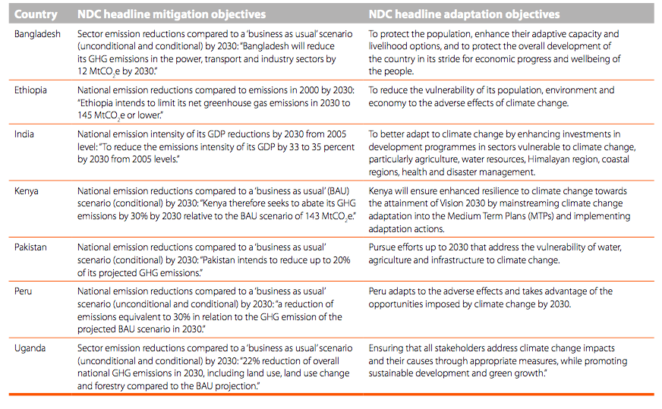Integrating international climate change commitments into national development planning

Introduction
The adoption of the Paris Agreement in 2015 signalled a major transition in the international climate change governance regime. The Agreement outlines the agreed global process for when the Kyoto Protocol ends in 2020. One of the building blocks of the Agreement is the Nationally Determined Contributions (NDCs), to which individual countries commit, in order to achieve the objective of keeping global warming as far as possible below 2°C, with the aim of 1.5°C.
Fulfilling these commitments will depend on the national priority they are given. Governments have long established priority-setting processes, led by ministries of finance and planning. The likelihood of climate change actions being implemented successfully is dependent on such actions being recognised within this national planning and finance regime. As NDCs develop, the integration of climate change actions into national development planning will be necessary if the resources for implementation are to be secured, both domestically and from international sources.
This paper* examines what is necessary to support the successful integration of climate change (and specifically NDC) commitments into national development planning. The approach taken has been to develop a set of ten propositions related to the effectiveness of policy and planning processes, and to the institutional architecture and allocation of resources that, if followed, will support this integration.
*Download the full paper from the right-hand column. An overview of the 10 propositions and the paper’s conclusions is provided below.
Key messages – 10 propositions
This paper examines how to support the successful integration of Nationally Determined Contributions (NDCs) into national development planning. The paper develops a set of ten propositions that, if followed, would likely secure this objective. The propositions draw from an analytical framework developed by the Overseas Development Institute (ODI) to test the effectiveness of national climate change actions. This framework addresses policy and planning processes, the institutional architecture, and the financing of climate change actions and has been adapted for this study (see Annex). Each proposition is examined using evidence primarily from seven countries where the Climate and Development Knowledge Network (CDKN) has supported the development and early implementation of NDCs (Peru, Ethiopia, Uganda, Kenya, Pakistan, India and Bangladesh). The paper provides illustrations of these propositions in practice, drawing on experience from CDKN’s technical assistance and elsewhere.
The 10 propositions of the paper are summarised in brief as follows:
1) NDCs should be consistent with national development policies
- In all the countries reviewed, it was apparent that the first NDCs had been prepared in knowledge of both the national climate change policy and, in most cases, the national development plan. For example, in Kenya the NDC is currently feeding into the development of the country’s third Medium Term Plan, which will identify key policy actions, reforms, programmes and projects that the Government will implement over the 2018–22 period. By ensuring such connections are made, the likelihood of successful implementation is increased.
2) NDCs should follow SMART design principles
- All seven countries include both mitigation and adaptation objectives in their first NDCs (Table 1). If early action is to be facilitated, these objectives need to be clearly understood by implementing agencies.
- Objectives that allow for SMART targets to be constructed (that are Specific, Measurable, Agreed-upon, Realistic and Time-bound) is one well established approach to establishing clarity in objective setting.

3) NDCs should have broad national support
- Among national development priorities, climate change – in particular – encompasses the everyday livelihoods and challenges of all citizens, with climate change outcomes being dependent on the action of all.
- Having broad national support for climate action is therefore necessary.
- High quality and extensive consultation throughout the policy process is one way of securing such buy-in.
4) NDCs should have clear political backing
- The question of who approves the NDC provides an insight into the level of national ownership over these commitments.
- In each of the countries reviewed, NDC approval was given by the Prime Minister or the Cabinet, signalling the highest possible level of political backing. This is significant in that it necessarily creates awareness at the highest level of government and provides a clear message about what the country’s political leaders are committed to deliver. This in turn should influence the consideration of such commitments into broader economic policy and help avoid policy conflicts.
5) NDC development should have clear institutional leadership
- The national UNFCCC Focal Point in all seven countries in this study is the ministry of environment, and it is these ministries that have played a key role in the development of their respective NDCs.
6) National coordination for climate change and development action should exist
- The fulfilment of NDC commitments will rely on actions across much of each country’s economy and hence will be enhanced through coordinated efforts.
- However, such coordination is not the default in many countries; rather, it is an acknowledged challenge to securing effective action.
7) NDC institutions should respond to local development needs
- National development planning in all seven countries includes the aim of reducing poverty.
- One way to secure the integration of NDC commitments with national development planning is therefore to ensure that such commitments recognise the needs of vulnerable groups through the actions of sector ministries.
- The adaptation goals of NDCs often make such linkages, and this is one reason why adaptation objectives feature so strongly in low-income countries’ NDCs.
8) NDC spending should be part of the national budget planning
- Present public investments for climate change action rely heavily on domestic resources in all the countries reviewed. This fact highlights the importance of the national budget for NDC implementation, particularly to fund the unconditional element of each country’s NDC. It also emphasises the broader challenge of NDC implementation when set in the context of many countries running budget deficits.
- Committing new and additional public expenditure under such circumstances is very challenging, although when such planned spending is part of the national budget it becomes integrated with other national development expenditure.
- The national budget planning process is also important for channelling the international climate finance that will be necessary in delivering developing countries’ climate actions.
9) NDC spending should be monitored and reported
- Confidence in the implementation of NDC commitments will rest in part on the necessary financial resources being released each year to support climate change actions.
- In each country, records of all development spending follow the budget process. Therefore, where programme-based budgets are in use the end-of-year outturn expenditure can be compared to the start-of-year budget, when this information is collated in a consistent manner.
10) NDC spending should be subject to national oversight and scrutiny
- National parliaments have played a very limited role in the development of NDCs to date. In part this reflects the fact that policy development looks more to the executive rather than the legislative branch of government in the countries reviewed. However, there is potential for parliaments (and their statutory committees and specialist offices) to play a greater role in NDC implementation, particularly on financing.
Conclusions
- The implementation of climate change actions can build on and strengthen wider development and social policy, with NDC commitments representing the opportunity to secure a fundamental shift in a country’s approach to economic development and poverty reduction.
- With the scientific understanding of climate change now clear on its detrimental impacts, particularly for low-income countries, the urgency to act is ever more pressing. Climate compatible development – where climate change actions are integrated into national development planning – is therefore essential.
-
The ten propositions raised in this paper can act as an early ‘check-list’ for national policy-makers, and their development partners, to review the readiness for such integration across the three domains of policy, institutional and resource effectiveness.
Suggested citation
Bird, N., Monkhouse, C. and Booth, K. (2017) 10 propositions for success. Integrating international climate change commitments into national development planning. Climate and Development Knowledge Network: London
Related resources
- Go to CDKN's website
- Read 'Budgeting for NDC action – Initial lessons from climate-vulnerable countries'
- Read 'Supporting ambitious Intended Nationally Determined Contributions: Lessons learned from developing countries'
- Read 'Planning for NDC implementation: A Quick-Start Guide'
- Read 'Mainstreaming climate compatible development'
(0) Comments
There is no content